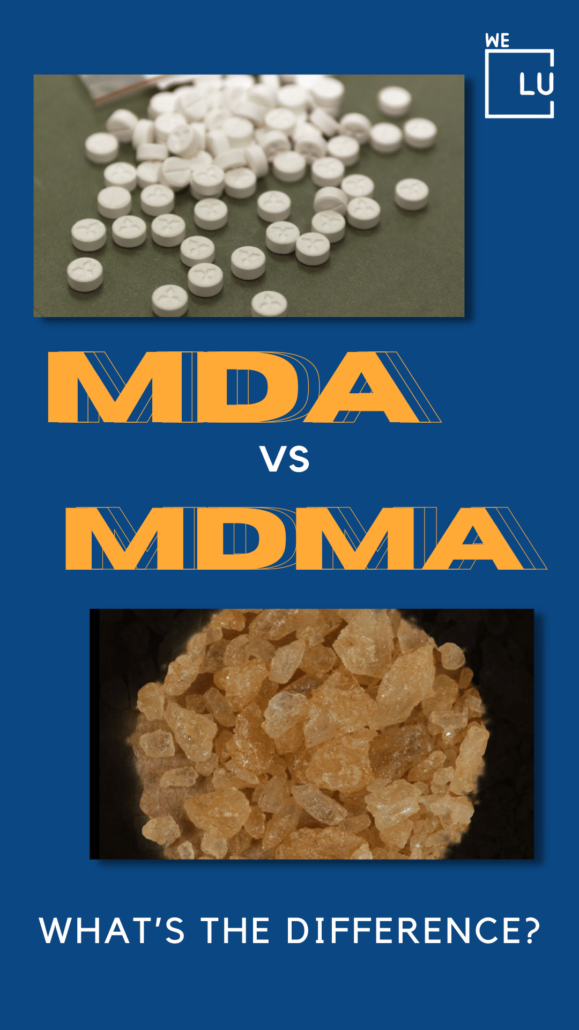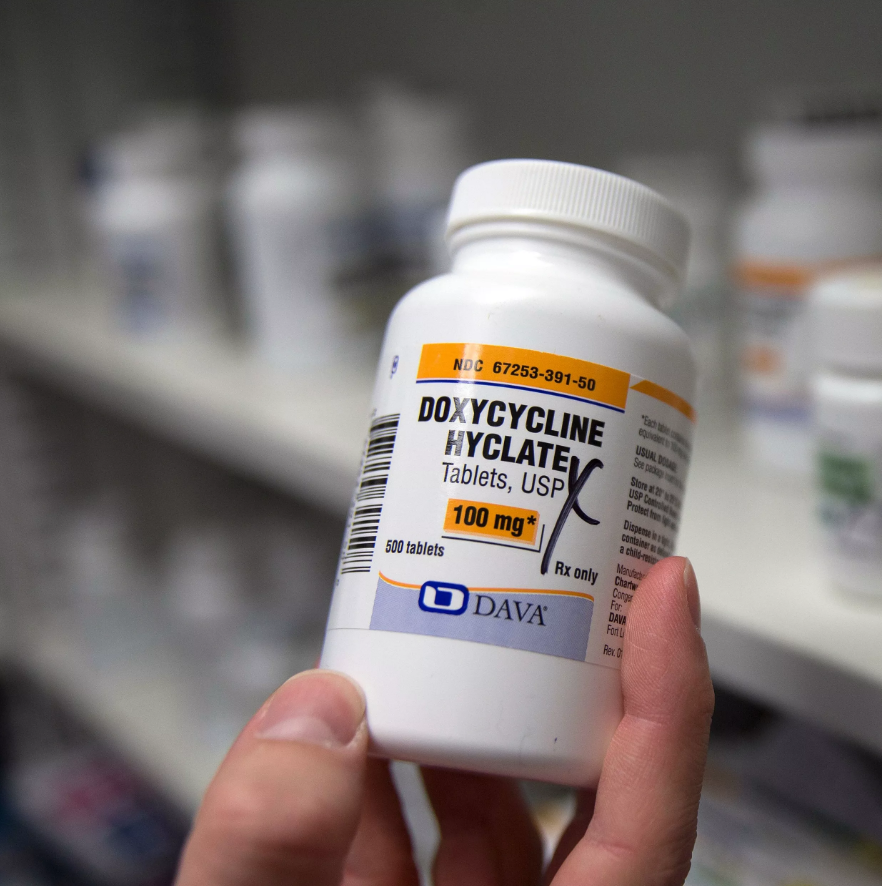What is MDMA Drug?
MDMA, which stands for 3,4-methylenedioxymethamphetamine, is a synthetic psychoactive drug known for its stimulant and empathogenic effects. It is commonly called “ecstasy” or “molly” when sold illicitly. MDMA use can enhance feelings of emotional closeness, empathy, and increased energy, making it a popular recreational substance, especially in party and club settings.
However, it is classified as a Schedule I controlled substance in many places due to its potential for abuse, lack of accepted medical use, and associated health risks, including dehydration, hyperthermia, and serotonin syndrome.
Looking for help with substance abuse challenges like MDMA addiction? Join thousands of clients who trusted We Level Up New Jersey for MDMA abuse and other substance use disorder treatments. Call 24/7 for more MDMA rehab information today. Your call is free and confidential. Access addiction professionals who understand your circumstances and are ready to help.
What Type of Drug is MDMA?
Many users lack knowledge about MDMA and its constituent ingredients, heightening the potential for dangerous effects and irresponsible behaviors. Despite molly being promoted as a purer variant of MDMA, substantial discrepancies exist between different batches.
In certain instances, these products may not contain any MDMA; instead, they could contain designer fentanyl, caffeine, cocaine, ketamine, bath salts, or other substances. Given this uncertainty, consumers cannot confirm the compound composition they receive when purchasing molly.
What Does MDMA Look Like?
What color is pure MDMA? MDMA, scientifically called methylenedioxymethamphetamine, is widely recognized as ecstasy and molly. Molly is frequently available in the form of capsules or powder, and it is typically ingested orally but can also be snorted. Ecstasy is commonly distributed as vibrantly colored tablets.
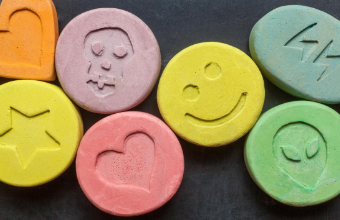
MDMA Street Names
Some other names for MDMA/molly/ecstasy:
- Mandy.
- E.
- Beans.
- Adam.
- Candy.
- Cowies.
- Hug Drugs.
- Crystal.
- Dancing Beans.
- E-bomb.
- Skittles.
- Pink Superman.
- Vowels.
- Smartee; & many others.
What is MDMA like? MDMA is typically found in a crystalline or powdered form, and its color can vary. Then, what color is pure MDMA? Pure MDMA is usually white or off-white. However, ecstasy tablets (which may contain MDMA as an active ingredient) are often colored and can vary significantly in appearance, including shades of pink, blue, green, yellow, or other colors.
MDMA Effects on Brain
MDMA enhances the functioning of three essential brain chemicals:
- Dopamine:
- It promotes heightened energy levels and activity.
- Operates within the reward system to reinforce behaviors.
- Norepinephrine:
- It raises heart rate and blood pressure, which can be risky for individuals with heart and blood vessel conditions.
- Serotonin:
- It impacts mood, appetite, sleep, and various bodily functions.
- Initiates the release of hormones affecting sexual arousal and trust.
- The substantial release of serotonin is likely responsible for the emotional intimacy, elevated mood, and heightened empathy experienced by MDMA users.
Despite its favorable effects, frequent or heavy MDMA use can develop tolerance, where users need increasingly higher doses to achieve the desired effects, which can increase the risk of addiction.
MDMA Risks
MDMA is a stimulant with hallucinogenic properties akin to substances like mescaline or peyote. Its impact extends to vital organs, including the brain and heart.
Also, MDMA can induce severe reactions, contingent on the individual’s usage and whether they combine it with other drugs or alcohol, which can significantly amplify the dangers associated with its use. This combination may even have fatal consequences.
Long-term use of MDMA can lead to alterations in the brain’s systems. Prolonged and heavy use of this drug can disrupt the brain’s normal functioning, particularly the serotonin system, which regulates mood and emotions. This rewiring can result in mood disorders, cognitive impairments, and other mental health issues, underscoring the importance of using MDMA cautiously and sparingly to minimize these potential long-term effects.
MDMA Drug Interactions
MDMA (ecstasy or molly) can interact with various drugs, potentially leading to dangerous or harmful effects. Here’s a list of some typical drug interactions:
- Antidepressants, particularly selective serotonin reuptake inhibitors (SSRIs).
- Stimulants like amphetamines or cocaine.
- Alcohol.
- Prescription medications like certain antipsychotics.
- Over-the-counter drugs, such as cough suppressants.
- Marijuana.
- Medications that affect blood pressure.
- Other recreational drugs like LSD or ketamine.
- Prescription painkillers, especially opioids.
- Antihistamines.
What is a MDMA Overdose?
An MDMA overdose occurs when an individual consumes a significantly higher amount of the drug than their body can safely metabolize. MDMA (ecstasy or molly) overdose can result in a range of severe and potentially life-threatening symptoms. These may include:
- High body temperature (hyperthermia).
- Rapid heartbeat and elevated blood pressure.
- Profuse sweating.
- Dehydration and electrolyte imbalances.
- Confusion, agitation, or hallucinations.
- Seizures.
- Kidney failure.
- Cardiovascular complications like heart attack or stroke.
- Loss of consciousness or coma.
In severe cases, an MDMA overdose can be fatal. If you suspect someone is experiencing an MDMA overdose, you must seek immediate medical attention by calling emergency services.
MDMA Withdrawal Symptoms
Following the cessation of molly or MDMA’s effects, withdrawal symptoms may manifest, which encompass:
- Cravings for the drug.
- Feelings of depression.
- Confusion.
- Memory impairment.
These withdrawal symptoms may intensify if the dosage and frequency of MDMA use escalate, potentially indicating an addiction or substance use disorder. Some individuals may resort to frequent MDMA use to prevent these withdrawal symptoms. Nevertheless, recurring use of MDMA carries several risks, including:
- Elevated heart rate and irregular rhythm.
- Panic attacks.
- Heightened anxiety, depression, and confusion.
- Seizures.
- Dehydration.
- Kidney problems.
How is MDMA Used?
MDMA (3,4-methylenedioxymethamphetamine) is commonly used recreationally for its mood-altering effects, often in party or club settings. How to use MDMA? It can be consumed in various ways, including:
- Oral Ingestion: MDMA is frequently consumed orally in tablets, capsules, or occasionally in powdered form. Users may refer to these tablets as “ecstasy” or “pills” and the powdered form as “molly.”
- Snorting: Some individuals crush MDMA tablets into a powder and snort it through the nose. This method leads to a more rapid onset of effects but can also intensify potential side effects.
- Injection: While less common, some users may dissolve MDMA powder in water and inject it intravenously. This method is the fastest way to feel the effects but also carries significant health risks, including the risk of infection.
- Bombing or Parachuting: In this method, users wrap MDMA powder in a piece of paper (like a tissue or rolling paper) and swallow it, similar to taking a pill. The form dissolves in the stomach, releasing the drug.
MDMA is illegal in many countries and can be dangerous, especially when abused or mixed with other substances. Using it in moderation, if at all, and being aware of potential risks is essential for harm reduction.
How Does MDMA Affect the Brain?
The drug’s effects can vary depending on factors such as dosage, frequency of use, individual differences, and the presence of other substances in the system, which can complicate how MDMA affects the brain. Here’s the breakdown of how MDMA affects the brain:
Serotonin Release
MDMA primarily increases the release of serotonin, a neurotransmitter crucial in mood regulation, emotions, and social behavior. The surge in serotonin levels contributes to euphoria, emotional closeness, and empathy often associated with MDMA use.
Dopamine Release
MDMA also prompts the release of dopamine, a neurotransmitter involved in pleasure and reward. This release contributes to the heightened sense of pleasure and mood elevation experienced by users.
Norepinephrine Effects
MDMA leads to the release of norepinephrine, responsible for increased heart rate, blood pressure, and alertness. These effects can result in heightened energy and wakefulness.
Depletion of Serotonin
Prolonged or heavy MDMA use can deplete the brain’s serotonin stores, leading to mood disturbances such as depression, anxiety, and impaired cognitive function. This is one reason some individuals experience “comedowns” or negative after-effects following MDMA use.
MDMA (3,4-methylenedioxymethamphetamine) affects the brain by altering the activity of various neurotransmitters, primarily serotonin, dopamine, and norepinephrine. However, the exact mechanisms and long-term effects of MDMA on the brain are still subjects of ongoing research.
Is MDMA Addictive?
What is the MDMA use disorder diagnosis? Specific individuals may exhibit signs of drug dependence and experience withdrawal symptoms when using MDMA regularly. Seeking assistance from a qualified addiction specialist can be instrumental in addressing these symptoms and facilitating recovery.
Behaviors that might be indicative of an MDMA addiction include:
- Noticeable alterations in personality or behavior.
- Neglecting regular daily responsibilities and routines.
- Intense urges or compulsions to use MDMA, even in the face of adverse consequences.
- Experiencing withdrawal symptoms.
- Centering one’s life around MDMA, including thoughts about obtaining and using it.
- Sacrificing other essential obligations such as work and social engagements in favor of MDMA use.
MDMA is a Schedule I drug.
The Drug Enforcement Administration (DEA) classified MDMA as a substance devoid of any medical utility and possessing a significant likelihood of abuse or addiction. Consequently, the sale, purchase, or use of any form of MDMA, including molly, is illegal within the United States.
Furthermore, there exist potent designer cathinone stimulants colloquially referred to as “bath salts,” which are sometimes deceptively marketed as molly. Individuals consuming these alternates often experience intense cravings and more aggressive reactions.
Symptoms of MDMA Use
It shares chemical similarities with stimulants and hallucinogens, resulting in sensations of heightened energy, pleasure, emotional warmth, and altered sensory perception, including distorted time perception.
As per information from the National Institute on Drug Abuse (NIDA), individuals who frequently use molly may develop a dependence on it and may encounter withdrawal symptoms.
Molly typically takes effect within 30 to 45 minutes after consumption, with its effects lasting approximately six hours. The body can take up to two days to eliminate molly from the body system.
Immediate Effects of MDMA Use
- Increased energy levels.
- Heightened talkativeness.
- Elevated emotions, empathy, and trust.
- Enhanced sensitivity to light, sound, and touch.
- Feelings of giddiness or euphoria.
Furthermore, the consumption of molly can lead to potentially hazardous and, in certain instances, life-threatening effects on the body.
Severe Symptoms of MDMA Use
- High blood pressure.
- Potentially fatal increase in body temperature.
- Lack of awareness can damage decision-making and lead to things like dangerous driving.
- Anxiety.
- Depression.
- Confusion.
- Paranoia.
- Headache.
- Blurred vision.
- Nausea.
- Chills.
- Sweating.
- Dizziness.
- Sleeplessness.
- Irritability.
- Loss of appetite.
- Restless legs.
- Tense muscles.
- Memory problems.
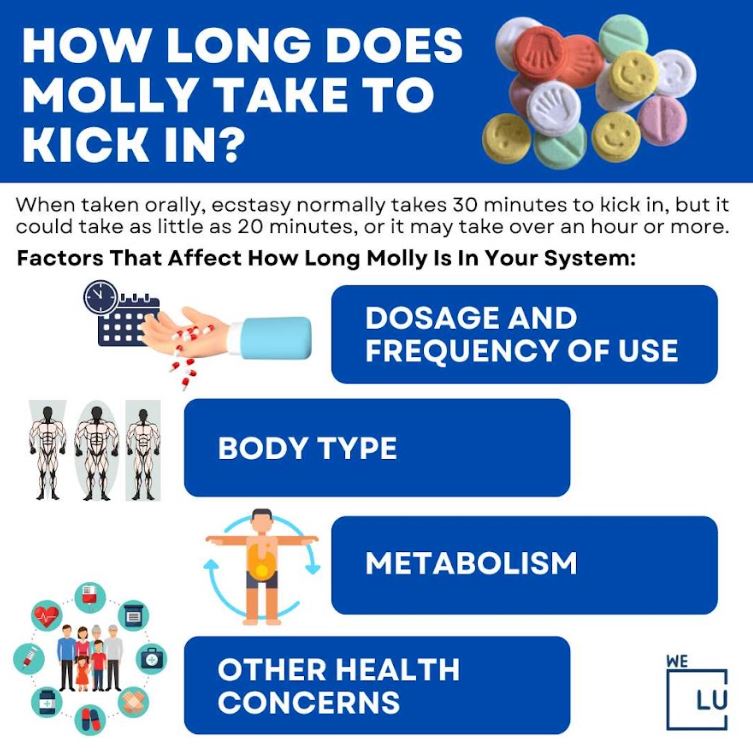
Skip To:
Learn More:
- How Long Does MDMA Stay in Your System? How Long Does Molly Stay in Your Urine, Blood, and Saliva?
- Can you Microdose MDMA? Risks and Side Effects of Microdosing MDMA. Microdosing MDMA Meaning.
- MDA vs MDMA, What’s The Difference?
- Dose of MDMA, Effects of MDMA Overdose
- How Long Does Molly Last? Withdrawal Side Effects, Risks, & Treatment Options for MDMA / Ecstasy
- The Dangers of Club Drugs, Understanding the Risks & Effects
- What Drugs Are in Ecstasy? Ecstasy Side Effects, Addiction, & Treatment
- Is Molly Meth? What is the Difference Between Molly vs Meth?
- Is Molly Addictive? Symptoms and Risks of Molly Addiction
- How To Take Molly Safely? The Facts of Molly Addiction
Treatment for MDMA Use Disorder
Treatment for MDMA use disorder entails addressing withdrawal symptoms, reducing drug cravings, and preventing relapse. The Food and Drug Administration (FDA) has not approved any medications specifically for treating MDMA use disorder. If you are concerned about using MDMA, it is advisable to contact a qualified healthcare professional for guidance and assistance.
Knowing when to seek help is crucial. Urgent intervention is warranted when your ecstasy use spirals out of control, as indicated by symptoms and potential complications, including cardiovascular issues, kidney damage, severe depression, psychosis, and other signs of abuse.
Given the potential challenges of MDMA addiction, seeking professional guidance and support is recommended. Medical professionals, therapists, and the We Level Up NJ MDMA rehab center can assist in managing these symptoms of withdrawal and abuse.
Get addiction counseling that works. Discover professional help from We Level Up’s addiction and mental health therapists. Start getting support with a free call to our addiction hotline.
Get Help. Get Better. Get Your Life Back.
Searching for Accredited Drug & Alcohol Rehab Centers Near You? Or Mental Health Support?
Even if you have failed previously, relapsed, or are in a difficult crisis, we stand ready to support you. Our trusted behavioral health specialists will not give up on you. Call us when you feel ready or want someone to speak to about therapy alternatives to change your life. Even if we cannot assist you, we will lead you wherever you can get support. There is no obligation. Call our hotline today.
FREE Addiction Hotline – Call 24/7What is MDMA Used for Medically?
What is MDMA-assisted therapy? MDMA (3,4-methylenedioxymethamphetamine) had limited approved medical uses in most places, and research in this area was ongoing. Here are some potential medical benefits and research areas for MDMA:
- Post-Traumatic Stress Disorder (PTSD) Treatment: MDMA-assisted psychotherapy has been investigated as a potential treatment for PTSD. Some clinical trials have shown promising results in reducing PTSD symptoms when MDMA is administered with therapy. The US Food and Drug Administration (FDA) designated MDMA as a “Breakthrough Therapy” for PTSD treatment, which suggests its potential in this context.
- Anxiety and Depression: Some early research has explored MDMA-assisted therapy for individuals with anxiety and depression, with promising results in some cases. However, more research is needed in this area.
- End-of-Life Care: MDMA-assisted therapy has been considered a tool to help individuals facing end-of-life issues, such as coping with the existential distress associated with terminal illness.
While MDMA shows potential in these areas, it is not yet approved by regulatory authorities for medical use in most countries. Research is ongoing to understand its safety and efficacy for these purposes.
MDMA What is it? Drug Facts
What is MDMA Made of?
What is the drug MDMA? MDMA, or 3,4-methylenedioxymethamphetamine, is synthesized through a chemical process that involves several precursor substances. The primary precursor for MDMA is safrole, obtained from certain trees’ roots. Through a series of chemical reactions, safrole is transformed into MDMA, resulting in either a crystalline or powdered form of the drug. MDMA is often found in illicit drug markets and may be mixed with other substances or impurities, so the purity and composition can vary significantly.
What is MDMA Hydrochloride?
MDMA hydrochloride, often called MDMA HCl, is the hydrochloride salt form of MDMA (3,4-methylenedioxymethamphetamine). It is a crystalline or powdered substance that is more stable and water-soluble than the freebase form of MDMA. MDMA hydrochloride is commonly used to synthesize and manufacture MDMA tablets or capsules sold illicitly, as it is easier to handle and store in this form.
What is MDMA on a Drug Test?
Here’s a rough timeline of MDMA detection for different kinds of drug tests:
- Urine Test: MDMA is typically detectable in urine for 1 to 3 days after use. It can sometimes be detected in heavy or chronic users for 4 to 5 days.
- Blood Test: MDMA is detectable in blood for a shorter period than in urine, typically 1 to 2 days. In rare cases, it may be detectable for up to 3 days in some individuals.
- Saliva Test: MDMA can be detected in saliva for a shorter period than urine or blood, usually up to 1 to 2 days after use.
- Hair Test: Hair tests have a longer detection window and can reveal MDMA use for an extended period, often up to 90 days or more after the last use, depending on the length of hair tested.
What Class is MDMA?
What drug class is MDMA? MDMA, also known as ecstasy or molly, is classified as a controlled substance and is typically placed in Schedule I under the Controlled Substances Act in the United States.
Schedule I substances have a high potential for abuse, lack accepted medical use, and are prohibited for most purposes, including recreational use. This classification reflects the legal stance that MDMA is a substance with a high risk of misuse and limited recognized therapeutic value.
What is Microdosing MDMA?
Microdosing MDMA involves taking minimal, sub-perceptual drug doses at regular intervals, typically lower than those used for recreational or therapeutic purposes. The goal is not to experience the full range of MDMA’s effects but to potentially benefit from subtle mood-enhancing or therapeutic effects while avoiding the intense euphoria or altered perception associated with higher doses.
Microdosing any substance, including MDMA, should be approached cautiously, as the long-term safety and potential risks are poorly understood, and such practices’ legality may vary by location.
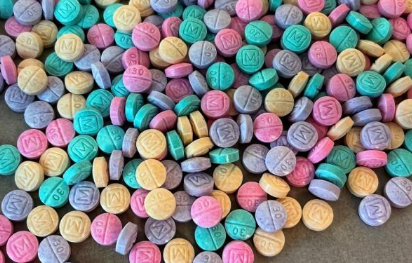

Get Your Life Back
Find Hope & Recovery. Get Safe Comfortable Detox, Addiction Rehab & Mental Health Dual Diagnosis High-Quality Care at the We Level Up Treatment Centers Network.
Hotline (877) 378-4154MDMA Statistics
MDMA is frequently used with other substances, such as alcohol, marijuana, or other drugs, which can increase the risks associated with its use. Its abuse is associated with various health risks, including dehydration, hyperthermia (overheating), serotonin syndrome, and potential long-term effects on mood and cognitive function.
2.1%
In 2019, roughly 2.1% of individuals in the US aged 12 and older had used MDMA or ecstasy at least once in their lifetime.
Source: NSDUH
22,498
There were 22,498 MDMA-related emergency department visits in the United States in 2011.
Source: SAMHSA
21 Million
Globally, an estimated 21 million people used ecstasy-type drugs (which often include MDMA) in 2019.
Source: UNODC
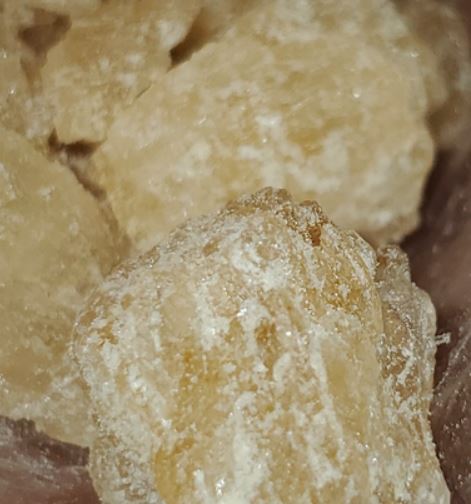
What is Pure MDMA?
Pure MDMA is a white crystalline powder. Pure MDMA is not mixed with other drugs, chemicals, or fillers, and it does not contain any additional substances commonly found in ecstasy tablets or capsules, such as caffeine, amphetamines, or other stimulants.
Pure MDMA is relatively rare in illicit drug markets, as most MDMA sold in these markets is adulterated or mixed with other substances. The purity and composition of MDMA can vary significantly, making it challenging for users to know the exact content and quality of the sense they are consuming. Using pure MDMA, if verified as such, carries fewer risks associated with the presence of unknown or potentially harmful additives. However, using any illicit drug carries inherent risks and is illegal in many jurisdictions.
First-class Facilities & Amenities
World-class High-Quality Addiction & Mental Health Rehabilitation Treatment
Rehab Centers TourRenowned Addiction Centers. Serene Private Facilities. Inpatient rehab programs vary.
Addiction Helpline (877) 378-4154Proven recovery success experience, backed by a Team w/ History of:
15+
Years of Unified Experience
100s
5-Star Reviews Across Our Centers
10K
Recovery Success Stories Across Our Network
- Low Patient to Therapist Ratio
- Onsite Medical Detox Center
- Comprehensive Dual-Diagnosis Treatment
- Complimentary Family & Alumni Programs
- Coaching, Recovery & Personal Development Events
How Addictive is MDMA?
MDMA (3,4-methylenedioxymethamphetamine) has the potential for psychological dependence and addiction, although it is generally considered less physically addictive than substances like opioids or nicotine. Addiction to MDMA is often more related to its psychological effects, such as euphoria, enhanced sociability, and emotional closeness, which can lead some individuals to use it compulsively. Frequent or heavy MDMA use can result in the development of tolerance, where users need increasingly higher doses to achieve the desired effects, which can increase the risk of addiction.
MDMA or ecstasy addiction is a dangerous condition that can place any user in life-threatening jeopardy. This addiction can lead to substantial deterioration across all aspects of your life, with the gravest concern being the potential long-term consequences, including the risk to your life. Consequently, if someone you care about is grappling with severe addiction, seeking help is imperative.
Finding Treatment for MDMA Addiction at We Level Up New Jersey
To overcome an ecstasy or MDMA addiction, professional assistance is typically essential, mainly when the problem is chronic and involves using other substances besides ecstasy. Treatment for ecstasy addiction in a detox facility is always tailored to suit your circumstances and needs.
Detoxification (Detox): Your treatment journey typically commences with medical detox, which facilitates the removal of residual ecstasy substances from your system. This phase addresses your physical dependence on the drug and effectively manages any withdrawal symptoms you may experience.
Rehabilitation (Rehab): Following the detox phase, you will transition into residential care, where you will engage in psychological treatment through various behavioral therapies such as Cognitive Behavioral Therapy (CBT) and Dialectical Behavioral Therapy (DBT), among others.
Aftercare: Your path to recovery does not conclude with formal treatment. Recovery is an ongoing process that extends beyond your time in treatment. Your treatment center will provide you with an aftercare program upon your departure. Moreover, participating in support groups is vital to maintaining your progress in recovery.
The impact of MDMA is not limited to recreation; it can lead to long-term addiction issues, resulting in a life centered around the drug.
If you or someone you care about is seeking a safe, supportive, and compassionate resource for MDMA addiction treatment, We Level Up New Jersey is available to assist you. Do not hesitate to reach out and speak with an addiction counselor today about the range of care options we offer.
Overcoming MDMA Addiction. Find the Support You Need.
Withdrawal from Adderall is often a challenging process to go through alone. Many people experience relapses during withdrawal in an attempt to alleviate symptoms and satisfy cravings. However, you can manage withdrawal symptoms and successfully recover with detox and rehab therapy and a robust support system at the We Level Up treatment centers. If you require assistance with your rehab journey, contact a We Level Up treatment professional now. Your call is free and confidential.
Get a free rehab insurance check without any obligation.
World-class, Accredited, 5-Star Reviewed, Effective Addiction & Mental Health Programs. Complete Behavioral Health Inpatient Rehab, Detox plus Co-occuring Disorders Therapy.
CALL (877) 378-4154End the Addiction Pain. End the Emotional Rollercoaster. Get Your Life Back. Start Drug, Alcohol & Dual Diagnosis Mental Health Treatment Now. Get Free No-obligation Guidance by Substance Abuse Specialists Who Understand Addiction & Mental Health Recovery & Know How to Help.
Top 8 What Drug is MDMA? FAQs
-
What is MDMA used to treat?
MDMA is not approved for any specific medical treatment in the United States. It is primarily known as a recreational drug and is classified as a Schedule I controlled substance due to its high potential for abuse and lack of accepted medical use.
-
What is MDMA made from?
MDMA, commonly known as ecstasy or molly, is synthesized from a precursor chemical called safrole, derived from specific trees’ roots. The synthesis process involves several chemical reactions, resulting in the production of MDMA crystals or powder, which is then often mixed with other substances for illicit distribution.
-
What is MDMA stand for?
MDMA stands for 3,4-methylenedioxymethamphetamine. What classification is MDMA? It is a synthetic drug known for its stimulant and empathogenic effects, commonly used recreationally for its mood-altering properties.
-
What is MDMA assisted psychotherapy?
Experts are studying MDMA’s effects as part of therapy for severe post-traumatic stress disorder (PTSD). MDMA-assisted psychotherapy is a therapeutic approach currently being researched in clinical trials that involves using MDMA in a controlled and supervised setting to enhance the effectiveness of psychotherapy sessions. MDMA is administered to help patients confront and process traumatic memories and emotions while working with a trained therapist.
-
What kind of drug is MDMA?
MDMA, also known as ecstasy or molly, is a synthetic drug that belongs to the class of substances known as entactogens, which produce empathogenic effects, enhancing feelings of emotional closeness and empathy. It also has stimulant and hallucinogenic properties, making it a unique combination of these three effects.
-
What is a typical dose of MDMA?
A typical recreational dose of MDMA, also known as ecstasy or molly, ranges from 75 to 125 milligrams, though some users may take higher amounts. The precise quantity can vary based on factors such as an individual’s weight, tolerance, and the purity of the substance. MDMA use carries risks, and local laws and regulations should cautiously approach it.
-
What is microdose MDMA?
Microdosing MDMA refers to taking minimal, sub-perceptual doses of the drug regularly, typically at levels much lower than those used for recreational or therapeutic purposes. The goal is not to experience the full effects of MDMA but rather to potentially benefit from subtle mood-enhancing or therapeutic effects while minimizing the risks and drawbacks associated with higher doses.
-
What schedule is MDMA?
In the United States, MDMA is classified as a Schedule I controlled substance. This means that it is considered to have a high potential for abuse, lacks accepted medical use, and is prohibited for most purposes, except for limited research studies with appropriate approvals.
“I Turned My Life Around from Drug and Alcohol Addiction, Loneliness, Despair, and Anxiety to a Full Recovery” – Recovery Testimonial Video
Recovery from MDMA abuse is possible and crucial for individuals struggling with its adverse effects. Seeking help and support is the first step towards regaining control over your life. Professional treatment programs, therapy, and counseling effectively address MDMA addiction and its underlying causes. Don’t hesitate to contact We Level Up NJ addiction specialists to start your journey toward recovery and a healthier, drug-free life.
Experience Transformative Recovery at the We Level Up Treatment Center.
See our authentic success stories. Get inspired. Get the help you deserve.



Start a New Life
Begin with a free call to an addiction & behavioral health treatment advisor. Learn more about our dual-diagnosis programs. The We Level Up treatment center network delivers various recovery programs at each treatment facility. Call to learn more.
- Personalized Care
- Caring Accountable Staff
- World-class Amenities
- Licensed & Accredited
- Renowned w/ 5-Star Reviews
We’ll Call You
Search We Level Up NJ What is MDMA? Detox, Mental Health Topics & Resources
Sources
[1] Madero S, Alvarez OD. Premise, promise, and challenges of MDMA-assisted therapy for PTSD. Eur Neuropsychopharmacol. 2023 May;70:19-20. Doi 10.1016/j.euroneuro.2023.02.002. Epub 2023 Feb 15. PMID: 36806884; PMCID: PMC9930690.
[2] Kalant H. The pharmacology and toxicology of “ecstasy” (MDMA) and related drugs. CMAJ. 2001 Oct 2;165(7):917-28. PMID: 11599334; PMCID: PMC81503.
[3] MDMA (Ecstasy/Molly) – National Institute on Drug Abuse (NIDA) What is MDMA? What Type of Drug is MDMA? Related topics.
[4] NIDA. 2020, June 15. MDMA (Ecstasy/Molly) DrugFacts. Retrieved from https://nida.nih.gov/publications/drugfacts/mdma-ecstasymolly on 2023, June 10
[5] Drug Fact Sheet: Ectasty/MDMA – Drug Enforcement Administration (DEA)
[6] Ecstasy Or MDMA (also Known As Molly) – Drug Enforcement Administration (DEA) What is MDMA? What Type of Drug is MDMA? Related topics.
[7] Ecstasy or MDMA (also known as Molly) – Get Smart About Drugs available from: https://www.getsmartaboutdrugs.gov/drugs/ecstasy-or-mdma-also-known-molly
[8] 3,4-Methylenedioxymethamphetamine – Department of Justice (USDOJ) What is MDMA? What Type of Drug is MDMA? Related topics.
[9] Associations between MDMA/ecstasy use and physical health in a U.S. population-based survey sample – Substance Abuse and Mental Health Services Administration (SAMHSA)
[10] MDMA/ecstasy use and psilocybin use are associated with lowered odds of psychological distress and suicidal thoughts in a sample of US adults – Substance Abuse and Mental Health Services Administration (SAMHSA)
